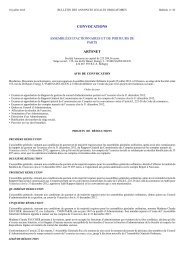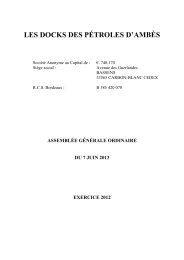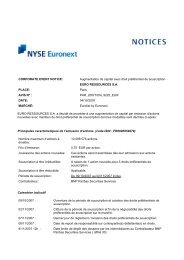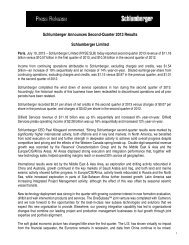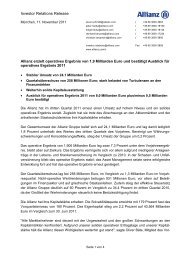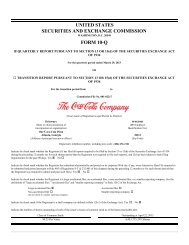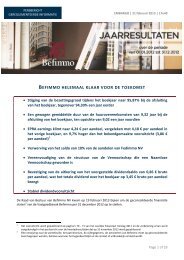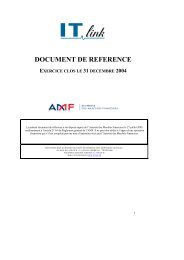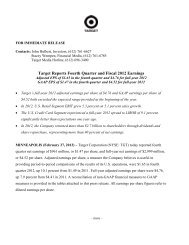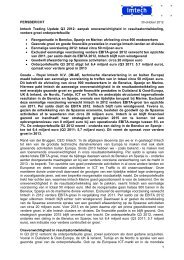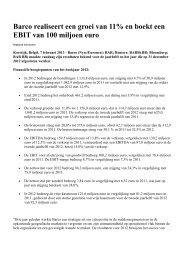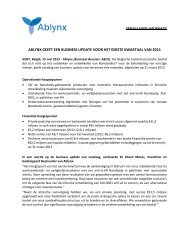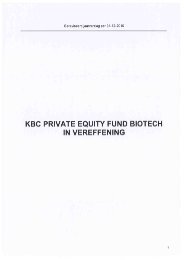2006 Annual Report
2006 Annual Report
2006 Annual Report
Create successful ePaper yourself
Turn your PDF publications into a flip-book with our unique Google optimized e-Paper software.
Management’s Responsibility for Financial Statements<br />
Management of Marriott International is responsible for the integrity<br />
and objectivity of the consolidated financial statements and other<br />
financial information presented in this annual report. In meeting this<br />
responsibility, we maintain a highly developed system of internal controls,<br />
policies and procedures, including an internal auditing function.<br />
The consolidated financial statements have been audited by<br />
Ernst & Young LLP, independent registered public accounting firm.<br />
Their report expresses an informed judgment as to whether management’s<br />
financial statements, considered in their entirety, fairly<br />
present our financial position, operating results and cash flows in<br />
conformity with U.S. generally accepted accounting principles.<br />
Management of Marriott International, Inc. (the “Company”) is<br />
responsible for establishing and maintaining adequate internal control<br />
over financial reporting and for the assessment of the effectiveness<br />
of internal control over financial reporting. As defined by the<br />
Securities and Exchange Commission, internal control over financial<br />
reporting is a process designed by, or under the supervision of, the<br />
Company’s principal executive and principal financial officers and<br />
effected by the Company’s Board of Directors, management and<br />
other personnel, to provide reasonable assurance regarding the reliability<br />
of financial reporting and the preparation of the consolidated<br />
financial statements in accordance with U.S. generally accepted<br />
accounting principles.<br />
The Company’s internal control over financial reporting is supported<br />
by written policies and procedures that: (1) pertain to the<br />
maintenance of records that, in reasonable detail, accurately and<br />
fairly reflect the Company’s transactions and dispositions of the<br />
Company’s assets; (2) provide reasonable assurance that transactions<br />
are recorded as necessary to permit preparation of the consolidated<br />
financial statements in accordance with U.S. generally<br />
accepted accounting principles, and that receipts and expenditures<br />
of the Company are being made only in accordance with authorizations<br />
of the Company’s management and directors; and (3) provide<br />
reasonable assurance regarding prevention or timely detection of<br />
unauthorized acquisition, use or disposition of the Company’s<br />
assets that could have a material effect on the consolidated financial<br />
statements.<br />
68 | MARRIOTT INTERNATIONAL, INC. <strong>2006</strong><br />
The Board of Directors pursues its responsibility for the financial<br />
statements through its Audit Committee, composed of four directors<br />
not otherwise employed by the company. The committee<br />
meets a minimum of four times during the year with the independent<br />
registered public accounting firm, representatives of management<br />
and the internal auditors to review the scope and results of<br />
the internal and external audits, the accounting principles applied<br />
in financial reporting, and financial and operational controls. The<br />
independent registered public accounting firm and internal auditors<br />
have unrestricted access to the Audit Committee, with or without<br />
the presence of management.<br />
Management’s <strong>Report</strong> on Internal Control Over Financial <strong>Report</strong>ing<br />
Because of its inherent limitations, internal control over financial<br />
reporting may not prevent or detect misstatements. Also, projections<br />
of any evaluation of effectiveness to future periods are subject<br />
to the risk that controls may become inadequate because of<br />
changes in conditions, or that the degree of compliance with the<br />
policies or procedures may deteriorate.<br />
In connection with the preparation of the Company’s annual consolidated<br />
financial statements, management has undertaken an assessment<br />
of the effectiveness of the Company’s internal control over<br />
financial reporting as of December 29, <strong>2006</strong>, based on criteria established<br />
in Internal Control-Integrated Framework issued by the<br />
Committee of Sponsoring Organizations of the Treadway Commission<br />
(the “COSO Framework”). Management’s assessment included an evaluation<br />
of the design of the Company’s internal control over financial<br />
reporting and testing of the operational effectiveness of those controls.<br />
Based on this assessment, management has concluded that as of<br />
December 29, <strong>2006</strong>, the Company’s internal control over financial<br />
reporting was effective to provide reasonable assurance regarding<br />
the reliability of financial reporting and the preparation of financial<br />
statements for external purposes in accordance with U.S. generally<br />
accepted accounting principles.<br />
Ernst & Young LLP, the independent registered public accounting<br />
firm that audited the Company’s consolidated financial statements<br />
included in this report, has issued an attestation report on management’s<br />
assessment of internal control over financial reporting, a<br />
copy of which appears on the next page of this annual report.



